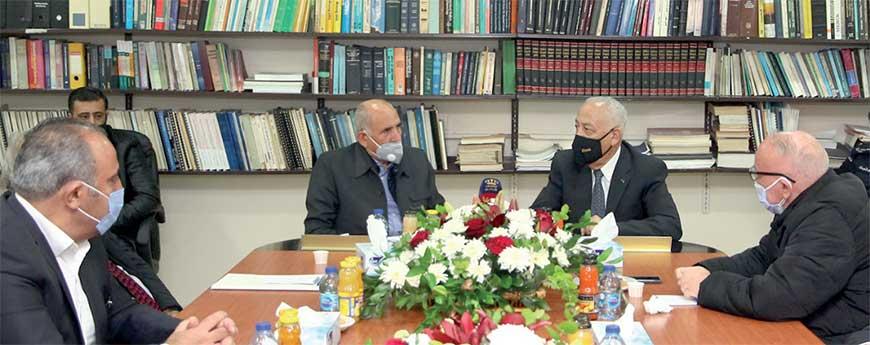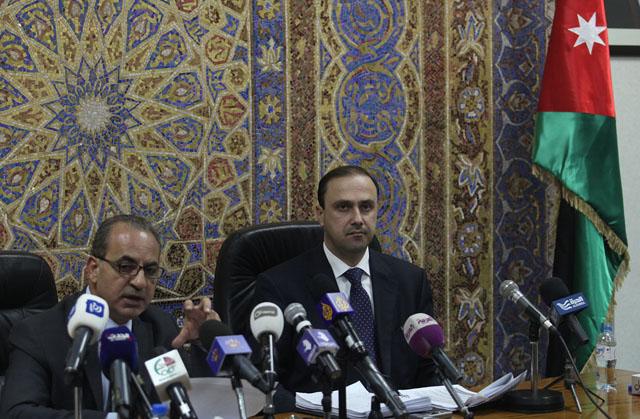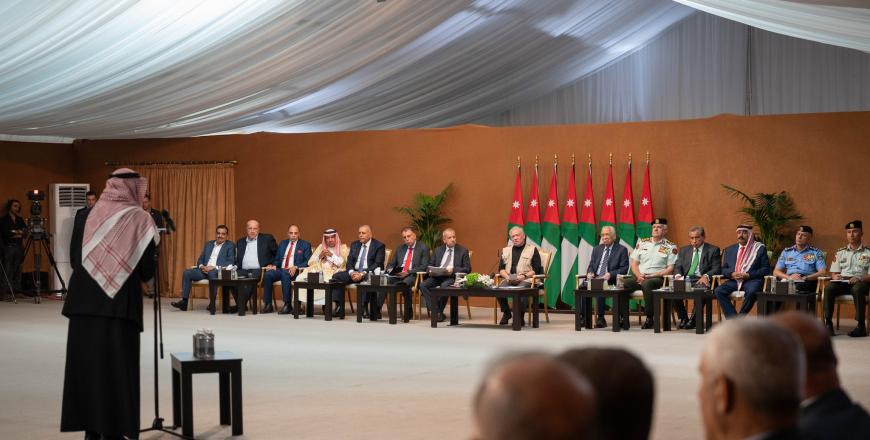You are here
Royal court chief inspects progress on Royal development projects in Zarqa
By JT - May 10,2025 - Last updated at May 10,2025

Royal Court Chief Yousef Issawi on Saturday inspects progress on development projects in the Tilaal Al Phosphate area (Phase II) and Wadi Al Ash in Zarqa Governorate (Petra photo)
AMMAN — Royal Court Chief Yousef Issawi, who also heads the committee overseeing the implementation of Royal Initiatives, on Saturday inspected progress on development projects in the Tilaal Al Phosphate area (Phase II) and Wadi Al Ash in Zarqa Governorate.
Issawi was accompanied by several senior officials, including Minister of Local Administration Walid Masri, Minister of Agriculture Khaled Hneifat, Minister of Industry, Trade and Supply Yousef Qudah, Minister of Environment Muawieh Radaideh, Zarqa Governor Firas Abu Qaoud, Director of the Royal Department for Environmental Protection Brig. Gen. Tembi Hamkari, Chairman of the Zarqa Chamber of Industry (ZCI) Fares Hammoudeh, Ruseifa Mayor Shadi Zeinati and Deputy Zarqa Mayor Fathi Khalayleh, according to a Royal Court statment.
Two ministerial committees, led by the Minister of Local Administration and comprising representatives of all relevant bodies, were overseeing the rehabilitation of the two sites. Their objective was to address environmental and infrastructure challenges and transform the areas into economic hubs through integrated planning, infrastructure development, and the allocation of land for investment, all in line with Royal directives.
In Ruseifa District, the delegation visited lands rehabilitated in Phase I, spanning around 134 dunums. These lands are earmarked for parks, recreational spaces, and investment projects that will serve residents of Ruseifa and nearby communities.
Masri presented scenarios for future development, with the Ministry of Local Administration set to commission a specialised consulting firm to prepare studies and plans, guided by committee proposals and local community needs. The government will provide public services and infrastructure, while inviting private sector investment.
The tour also included a visit to state-owned factories established on part of the Tilaal Al Phosphate lands, where Issawi was briefed on their operations. He also inspected the site of the former livestock market, which was relocated due to environmental and public health concerns.
At the entrance to Ruseifa along the Amman-Zarqa highway, Issawi toured the remaining phosphate hills that are slated for landscaping and rehabilitation. Plans include levelling, laying red soil, planting trees, and beautification efforts to improve the area’s visual appeal.
The delegation also reviewed the status of Ruseifa National Park. Discussions focused on the park’s rehabilitation and the enhancement of its agricultural and recreational facilities. As one of the city’s oldest parks and once its only major public outlet, the site will be managed and redeveloped by Ruseifa Municipality. The Central State Properties Committee has officially approved allocating the park land to the Ministry of Local Administration.
In the Wadi Al Ash industrial zone, Issawi reviewed redevelopment efforts aimed at establishing a hub for light industry. The area will benefit from improved infrastructure, road networks, upgraded entrances and exits, and updated regulatory frameworks.
The tour included inspection of a new 1,200-metre internal road connecting the industrial zone to the Amman-Zarqa highway. The road, part of the Royal Initiatives, features four lanes, a central median, a redesigned roundabout, and a monument donated by the Zarqa Chamber of Industry to commemorate the Jordanian state's centennial.
Issawi also followed up on efforts to link the area with the Amman Development Corridor. The two connecting roads are around 42 per cent complete and are expected to be finalised by the end of July.
Further stops included visits to 49 brick and stone-cutting factories, 28 of which are built on 48 dunums of state land, with the rest on private plots. Authorities are currently assessing options to integrate these facilities into the broader master plan, with attention to environmental standards, health regulations, and optimal land use.
Issawi was briefed on infrastructure upgrades and the challenges facing industrial and service development in the area, including road networks and utility provision. He emphasised the importance of removing obstacles, streamlining procedures, and ensuring quick, tangible outcomes, in accordance with Royal directives. He also urged full coordination and immediate action by all concerned agencies within their respective mandates.
Related Articles
AMMAN — Under the Royal directives of His Majesty King Abdullah, Royal Court Chief Yousef Issawi and a ministerial team on Thursday checked
The Cabinet on Sunday endorsed a plan that seeks to regulate the usage of plots of land on the Amman-Zarqa highway that were used by the phosphate company in the 1990s for mining purposes.
AMMAN (JT) — His Majesty King Abdullah on Monday called for capitalising on Ruseifa’s vital location to boost the industrial sector, stressi














